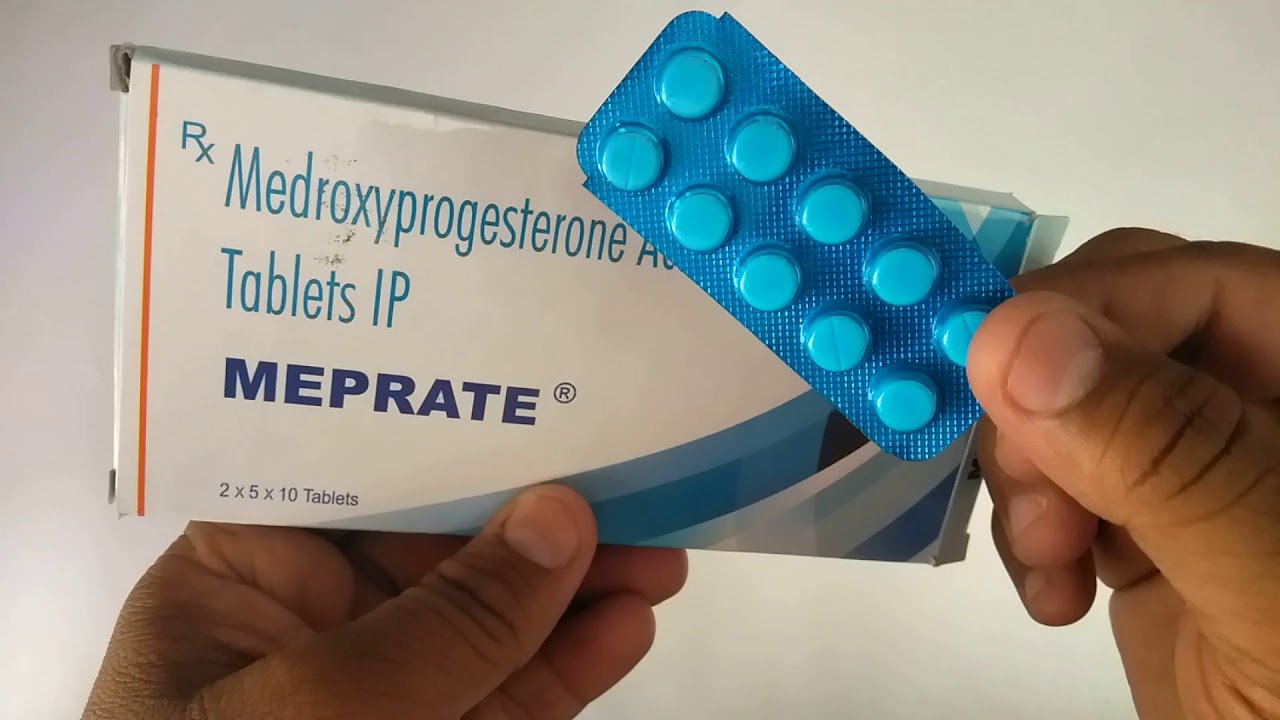Meprate 10 mg Tablet is a synthetic form of the hormone progesterone, which is used to treat various menstrual and gynecological disorders. It is commonly prescribed to regulate irregular menstrual cycles, treat endometriosis, and prevent pregnancy. In this article, we will discuss the uses, benefits, side effects, and FAQs of Meprate 10 mg Tablet in detail.
Uses of Meprate 10 mg Tablet
Meprate 10 mg Tablet is primarily used to treat the following conditions:
- Irregular menstrual cycles: Meprate 10 mg Tablet is used to regulate irregular menstrual cycles caused by hormonal imbalances or other underlying conditions.
- Endometriosis: Meprate 10 mg Tablet is used to treat endometriosis, a condition in which the tissue that lines the uterus grows outside the uterus, causing pain and discomfort.
- Amenorrhea: Meprate 10 mg Tablet is used to treat amenorrhea, a condition in which menstruation stops for several months or longer.
- Prevention of pregnancy: Meprate 10 mg Tablet is used as a contraceptive method to prevent pregnancy.
Benefits of Meprate 10 mg Tablet
Meprate 10 mg Tablet offers several benefits, including:
- Regulation of menstrual cycles: Meprate 10 mg Tablet helps to regulate irregular menstrual cycles and promotes regular periods.
- Treatment of endometriosis: Meprate 10 mg Tablet can reduce the symptoms of endometriosis, such as pain and discomfort, and may also prevent the growth of endometrial tissue.
- Prevention of pregnancy: Meprate 10 mg Tablet can be used as an effective contraceptive method to prevent pregnancy.
- Management of menopausal symptoms: Meprate 10 mg Tablet can help manage certain symptoms of menopause, such as hot flashes and mood swings.
Side Effects of Meprate 10 mg Tablet
Meprate 10 mg Tablet may cause some side effects, including:
- Nausea and vomiting
- Headache
- Dizziness
- Abdominal pain and cramps
- Breast tenderness
- Changes in menstrual bleeding pattern
- Mood changes
- Weight changes
- Acne or skin rash
In rare cases, Meprate 10 mg Tablet may cause severe side effects, such as:
- Allergic reactions, including hives, itching, and difficulty breathing
- Blood clots
- Liver problems
- High blood pressure
- Diabetes
It is important to seek medical attention if you experience any severe side effects.
More Post: Montemac FX Tablet: Uses, Dosage, Side Effects, and More
FAQs about Meprate 10 mg Tablet
Q. How should I take Meprate 10 mg Tablet?
A. Meprate 10 mg Tablet should be taken as prescribed by your doctor. It is usually taken orally, once a day, for a specific duration of time.
Q. Can Meprate 10 mg Tablet be taken during pregnancy?
A. Meprate 10 mg Tablet should not be taken during pregnancy, as it may harm the developing fetus.
Q. Can Meprate 10 mg Tablet be used while breastfeeding?
A. Meprate 10 mg Tablet can pass into breast milk and may harm a nursing baby. It is recommended to avoid breastfeeding while taking Meprate 10 mg Tablet.
Q. Can Meprate 10 mg Tablet be used by children?
A. Meprate 10 mg Tablet should not be used by children, as it may interfere with their normal growth and development.
Q. Can Meprate 10 mg Tablet cause weight?
A. Meprate 10 mg Tablet may cause weight changes as a side effect. It may cause weight gain in some individuals and weight loss in others.
Q. Can Meprate 10 mg Tablet be used to induce periods?
A. Yes, Meprate 10 mg Tablet can be used to induce periods in women who have missed their menstrual periods due to hormonal imbalances.
Q. Can Meprate 10 mg Tablet be used as an emergency contraceptive?
A. No, Meprate 10 mg Tablet is not an emergency contraceptive. It should be used only as a regular contraceptive method, as prescribed by your doctor.
Q. Can Meprate 10 mg Tablet cause hair loss?
A. Hair loss is not a common side effect of Meprate 10 mg Tablet. However, if you experience excessive hair loss or other unusual symptoms, you should consult your doctor.
Q. Can Meprate 10 mg Tablet be taken with alcohol?
A. It is not recommended to consume alcohol while taking Meprate 10 mg Tablet, as it may increase the risk of side effects and reduce the effectiveness of the medication.
In conclusion
Meprate 10 mg Tablet is a synthetic form of progesterone that is used to treat various menstrual and gynecological disorders. It offers several benefits, such as regulation of menstrual cycles, treatment of endometriosis, prevention of pregnancy, and management of menopausal symptoms. However, it may cause some side effects, including nausea, headache, abdominal pain, and changes in menstrual bleeding pattern. It is important to seek medical attention if you experience any severe side effects. If you have any questions or concerns about Meprate 10 mg Tablet, you should consult your doctor.
